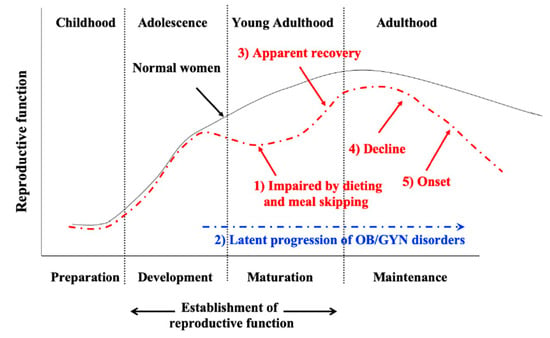Adolescent dietary habit-induced obstetric and gynecologic disease (ADHOGD) is dieting and breakfast skipping during adolescence and adulthood, impair development and maturation of the reproductive function (1), which induces latent progression of obstetrics and gynecologic disorders (2). Although recovery is achieved after correcting adverse eating habits (3), the reproductive function declines (4), and this leads to the latter onset of obstetrics and gynecologic diseases (5).
- ADHOGD
- adolescent
- breakfast skipping
- clock gene
- dieting
- dysmenorrhea
- obstetric and gynecological diseases
- young adulthood
1. Introduction
Currently, the hypothesis of developmental origins of health and disease (DOHaD) is causing marked concern throughout the world. This concept was initially called “fetal origins of adult disease”, proposing that exposure to certain environmental influences such as undernutrition during critical periods of development and growth may determine the onset of human diseases in adulthood. The DOHaD theory focuses on prenatal and perinatal stages as window periods when predictive adaptive responses can occur in the presence of environmental influences. In contrast, considering that reproductive organs extensively develop, grow, and mature during adolescence and adulthood, these stages are critical periods for establishment of the female reproductive function. Consequently, we propose the concept “adolescent dietary habit-induced obstetric and gynecologic disease (ADHOGD)”.
2. ADHOGD Theory
There are growing concerns that poor dietary behaviors at young ages will increase the future risk of chronic diseases in adulthood. Prof. T. Fujiwara first reported that female college students who skipped breakfast had higher incidences of dysmenorrhea and irregular menstruation, suggesting that meal skipping affects ovarian and uterine functions (T. Fujiwara, Int J food Sci Nutr, 2003). Since dysmenorrhea is more prevalent in those with a past history of dieting, she proposed a novel concept that inadequate dietary habits in adolescence become a trigger for the subsequent development of organic gynecologic diseases (T. Fujiwara, Int J food Sci Nutr, 2007). Since inadequate feeding that was limited during the non-active phase impaired reproductive functions in post-adolescent female rats, she and colleagues hypothesized that circadian rhythm disorders due to breakfast skipping disrupts the hypothalamic-pituitary-ovarian axis, impairs the reproductive rhythm, and leads to ovarian and uterine dysfunction (Fujiwara et al., Curr Dev Nutr, 2019). To explain how reproductive dysfunction is memorized from adolescence to adulthood, she and colleagues further hypothesized that the peripheral clock system also plays a critical role in the latent progression of reproductive diseases together with the central system, and proposed naming this concept “adolescent dietary habit-induced obstetric and gynecologic disease (ADHOGD)” (T. Fujiwara et al., Nutrients, 2020). This theory will contribute to analyzing the etiologies of and developing prophylaxes for female reproductive diseases from novel aspects, as shown in Figure 1[1][2].

Figure 1. Concept of adolescent dietary habit-induced obstetric and gynecologic disease (ADHOGD). Adverse dietary habits, such as dieting and breakfast skipping during adolescence and adulthood, impair development and maturation of the reproductive function (1), which induces the latent progression of obstetric and gynecologic disorders (2). Although apparent recovery is achieved after correcting adverse eating habits (3), the reproductive function is precociously declined (4), which later leads to the onset of obstetrics and gynecologic diseases (5).
This entry is adapted from the peer-reviewed paper 10.3390/nu12051294
References
- Tomoko Fujiwara; Diet during adolescence is a trigger for subsequent development of dysmenorrhea in young women. International Journal of Food Sciences and Nutrition 2007, 58, 437-444, 10.1080/09637480701288348.
- Tomoko Fujiwara; Rieko Nakata; Skipping breakfast is associated with reproductive dysfunction in post-adolescent female college students. Appetite 2010, 55, 714-717, 10.1016/j.appet.2010.08.005.
